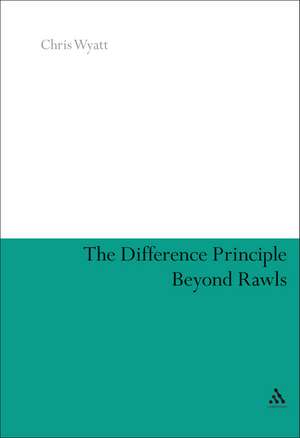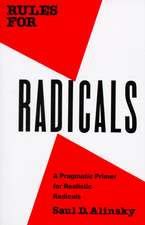The Difference Principle Beyond Rawls
Autor Chris Wyatten Limba Engleză Paperback – 2 noi 2011
| Toate formatele și edițiile | Preț | Express |
|---|---|---|
| Paperback (1) | 255.76 lei 6-8 săpt. | |
| Bloomsbury Publishing – 2 noi 2011 | 255.76 lei 6-8 săpt. | |
| Hardback (1) | 889.08 lei 6-8 săpt. | |
| Bloomsbury Publishing – 14 aug 2008 | 889.08 lei 6-8 săpt. |
Preț: 255.76 lei
Preț vechi: 330.28 lei
-23% Nou
Puncte Express: 384
Preț estimativ în valută:
48.95€ • 51.04$ • 40.68£
48.95€ • 51.04$ • 40.68£
Carte tipărită la comandă
Livrare economică 21 martie-04 aprilie
Preluare comenzi: 021 569.72.76
Specificații
ISBN-13: 9781441134868
ISBN-10: 1441134867
Pagini: 192
Dimensiuni: 156 x 234 x 10 mm
Greutate: 0.28 kg
Editura: Bloomsbury Publishing
Colecția Continuum
Locul publicării:New York, United States
ISBN-10: 1441134867
Pagini: 192
Dimensiuni: 156 x 234 x 10 mm
Greutate: 0.28 kg
Editura: Bloomsbury Publishing
Colecția Continuum
Locul publicării:New York, United States
Caracteristici
In accepting Rawlsâ?T premises yet rejecting his conclusion, the book offers an original content to a debate central to United Kingdom and North American political theory.
Notă biografică
Chris Wyatt is lecturer in Social Theory and Sociology at the University of Brighton. He is also affiliated to the University of Sussex, where he teaches Modern Political Thought and Contemporary Political Theory . He holds a Bachelor of Arts degree in Sociology, a Master of Arts degree in Social and Political Thought and a Ph.D. in Social and Political Thought.He is the author of The Difference Principle Beyond Rawls (Continuum, 2008)
Cuprins
Introduction 1. Social Justice 2. Rawlsian liberalism, Cole's guild socialism and New Economic Democracy 3. Towards a Left-LibertarianismChapter One : Rawls' Theory of Justice 1. Rawl's Method 2. Rawls' Premises 3. Rawls' ConclusionChapter Two: Cole's Libertarian Socialism 1. The Democratic Domain 2. The Functional Principle 3. Political Pluralism 4. Cole's Rejection of the Consumer Representing State and his Amplification of the Functional and Pluralist Principles Chapter Three: The Political Economy of New Economic Democracy 1. Democratic and Participatory Planning 2. Democratic Investment Planning 3. Analysing Democratic Investment Planning ConclusionChapter Four: From Property-Owning Democracy to Property-Controlling Democracy 1. The State and Sovereignty in Rawlsian Liberalism 2. The Commune and Sovereignty in New Economic Democracy 3. The Realisation of the Two Principles of Justice ConclusionChapter Five: Political Liberalism 1. Rawl's Political Liberalism 2. New Economic Democracy and Political Liberalism 3. Co-Operative Non-Aliening Labour and the Overlapping Consensus ConclusionConclusionBibliographyIndex
Recenzii
Mention -Chronicle of Higher Education, August 15, 2008












